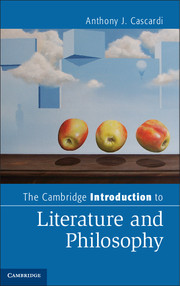Book contents
- Frontmatter
- Contents
- Acknowledgments
- Introduction
- Part I Questions of Truth and Knowledge
- Part II Questions of Value
- Part III Questions of Form
- Chapter 9 Ubiquitous Form
- Chapter 10 Linguistic Turns
- Chapter 11 Form, Narrative, Novel
- Chapter 12 Forms and Fragments
- Afterword Limits
- Glossary of Keywords
- Notes
- Index
- References
Chapter 12 - Forms and Fragments
Published online by Cambridge University Press: 05 June 2014
- Frontmatter
- Contents
- Acknowledgments
- Introduction
- Part I Questions of Truth and Knowledge
- Part II Questions of Value
- Part III Questions of Form
- Chapter 9 Ubiquitous Form
- Chapter 10 Linguistic Turns
- Chapter 11 Form, Narrative, Novel
- Chapter 12 Forms and Fragments
- Afterword Limits
- Glossary of Keywords
- Notes
- Index
- References
Summary
It’s tempting to associate the idea of form with the ideals of coherence and of a whole. After all, if form involves binding together elements of experience, concepts, imaginings, words, and so forth, then it would seem reasonable to focus on efforts to lend as much coherence and completeness to them as possible. In the last chapter we discussed the situation of the novel as confronting the problem of coherent form. There is more to be said on this subject. Most important is the fact that the novel is not a single form, but is itself comprised of many forms. The very first novel, Don Quixote, incorporates or alludes to the full spectrum of generic possibilities that any sophisticated writer of the time might conceivably have been aware of. This heterogeneity supports what Jacques Rancière described as “the ruin of the generic principle” and the “antigeneric principle of the equality of all represented subjects” in the novel (Mute Speech, 50).
Traditionally, genres were associated with particular subjects. But the novel is a form of prose fiction not necessarily linked to any particular subject at all. It is a form that could take up virtually any subject whatsoever. The novel became, in Rancière’s words, “a false genre, a non-generic genre … the genre of what has no genre: not even a low genre like comedy, with which some have assimilated it. This also means that it is lacking in any determinate fictional nature. … [I]t is the foundation of Don Quixote’s ‘madness,’ that is, his rupture with the requisites of a scene proper to fiction” (Mute Speech, 51). What the novel nonetheless does is incorporate many different genres and forms of speech into something that has the shape of a conversation among many voices. This is where the association of the novel with the project of world-making (even as a “world version”) is better traded for a different model entirely.
- Type
- Chapter
- Information
- The Cambridge Introduction to Literature and Philosophy , pp. 168 - 180Publisher: Cambridge University PressPrint publication year: 2014

